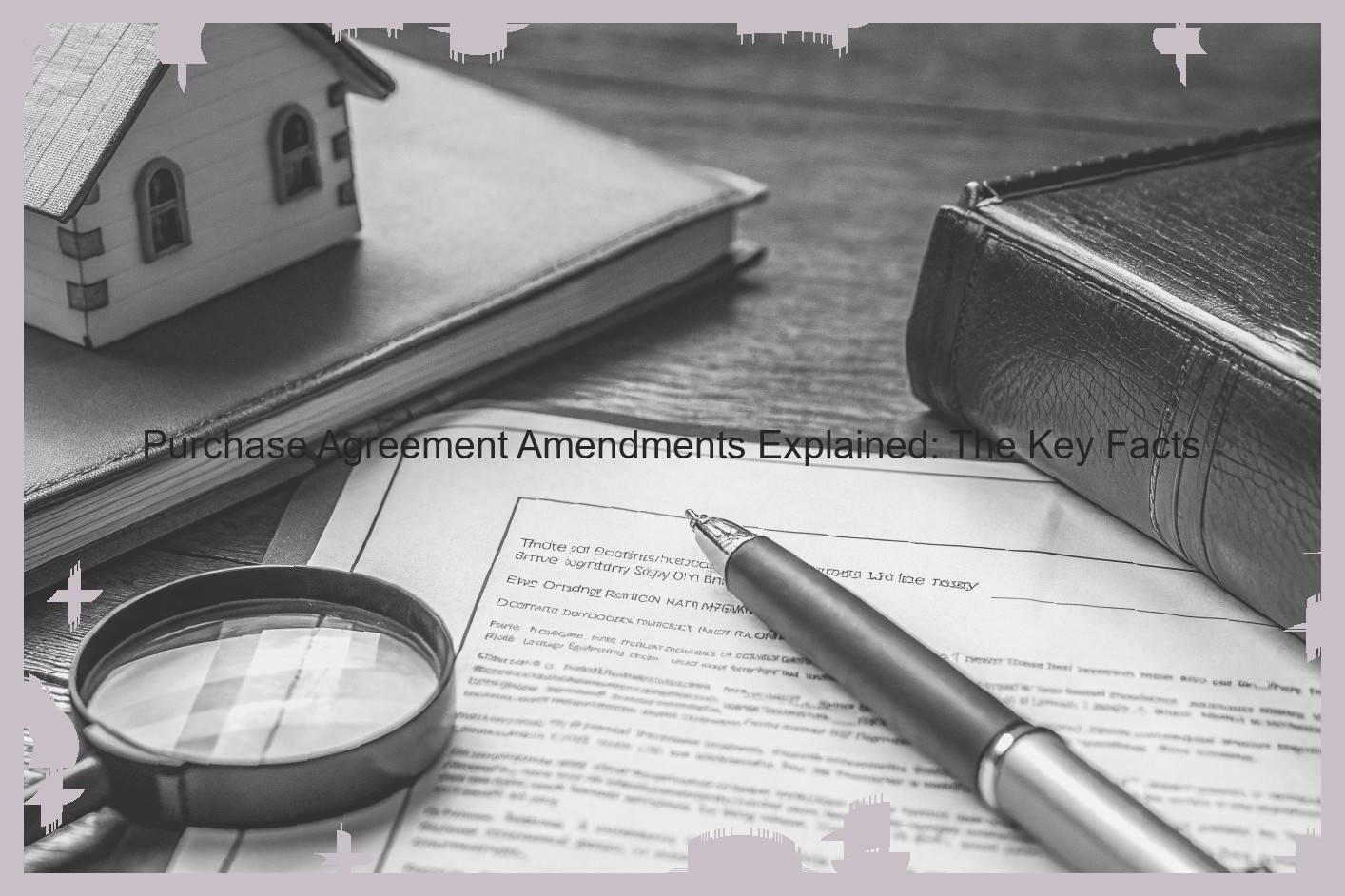What is an Amendment to a Purchase Agreement?
A purchase agreement amendment is a written contract that modifies a purchase agreement. Its purpose is to change or clarify terms contained in the original purchase agreement. Amendments are used often in the world of real estate because many purchases involve multiple contingencies, several of which rely on externals . For instance, a buyer uses contingencies to ensure that a property is what they want, that the price accurately reflects the property and that financing can be secured so money is available for closing. When these contingencies are not met, the parties will need to renegotiate their agreements so that the buyer can back out of a deal without financial repercussion.

Why Might a Purchase Agreement Need to be Amended?
Over the course of a deal, any number of things can occur that may make the original terms of the purchase agreement no longer commercially viable. Amending the purchase agreement in those instances allows the parties to adapt to changing circumstances and continue with the deal. As an example, a seller may request an amendment due to a failure to obtain the original financing, or a buyer may realize a need for additional inspection beyond the deadline contained within the purchase agreement. Perhaps additional time is required due to the need to conduct necessary zoning or land use approvals, or for the completion of other due diligence items. In such cases, it is not unusual for an amendment to be proposed by one or both of the parties during a real estate transaction. Sometimes, the seller may even propose an amendment to revise the purchase price to address the results of a survey, or to provide credit for repairs discovered by the buyer upon final inspection. Likewise, upon obtaining a survey of the premises, the buyer may seek an amendment to the purchase agreement to eliminate items on the survey that are acceptable to the buyer but not to the lender.
Crucial Components of a Purchase Agreement Amendment
Any amendment to a purchase agreement should include the following provisions: (a) identity of the parties; (b) identification of the subject agreement (specifying its date, title and parties); (c) statement of intent of the parties to amend such agreement; (d) specification of particular portions of the purchase agreement to be amended and the new language of such provisions; (e) location of any new material, including the title of the new section or the new paragraph of a section, with the old title and reference in parentheses, such as "Paragraph 4.1. Bad Air. (Old title was 4.1. Bad Water, old reference in new paragraph is Section 4.1);" and (f) signatures, both of client and of professional.
How to Create a Purchase Agreement Amendment
It is important to understand the terms of the existing agreement before proceeding with an amendment. Nothing should be accepted as true either verbally or in writing until the proposed amendment is completely reviewed and personalized to your situation.
An amendment to an already executed purchase agreement is typically the preferred way to modify the terms of the agreement. An amendment must incorporate by reference the original agreement it is going to be amending. The references will establish the parties that are involved in the transaction, the date of the original agreement, the date the amendment takes effect (typically the date the amendment is signed), the legal description of the property or the address of the property if no legal description has yet been provided, and the original purchase agreement document number. It is rare for the amendment to be only one page long, but the amendment may refer to the original purchase agreement in its entirety, which means the final total length of the amendment may be the updated purchase agreement and the original. Other than the additional page with the amendment terminology, the rest of the document will most likely be parts of the old purchase agreement .
The original purchase agreement must be thoroughly read and understood in its entirety to make the necessary changes to the following:
- Purchase price
- Closing date
- Buyer and Seller contact information including phone numbers and email addresses
- Liquidated damages paragraph identifying the Buyer and proposed amount that is now a fixed cost to the Buyer if the Seller has to sue the Buyer for specific performance and the Buyer is not completing the deal
- Credit for repairs to Seller which would be fixed costs that the Buyer could possibly absorb later if these repairs were not completed
- Amount of earnest money with the total deposit for the Buyer covering that amount made by the Buyer in case the Buyer has to some due to the Seller failing to maintain the property in the condition provided in the contract
- Other current issues as listed in the additional provisions paragraph including the new issues being added to the purchase agreement amendment
All parties need to sign the amended agreement and it needs to have a place for all parties to initial. The allowance of initialing in addition to signing can avoid the need to re-execute the entire agreement if one party only needs to address a one-word change. If the parties do not want to allow initialing on the amended purchase agreement, then only one full signature showing consent for all parties is needed. All parties should receive a copy of the signed amendment to the purchase agreement so everyone has the same exact copy of the final agreement during this amended period.
Legal Consequences of Purchase Agreement Amendments
"Any time two parties enter into a valid and enforceable contract, it is clear that unless there are very specific issues to be worked out later on and/or the issue is one of the individual parties discretion, the terms of the contract will be the same as they were at the time of the signing," Attorney Richard S. Bucher advises. "And, as it would happen, if one of the parties does not adhere to the terms of the contract, this is a breach of the contract and can and likely will result in a lawsuit being brought in order to ensure the offended party receives the damages that they are entitled to under the law; hence, a purchase agreement, amendment or not, is clearly a contract that must be adhered to by all parties involved."
However, the law is very clear. The even the slightest change to a purchase agreement is a legal amendment—amendments to the terms of the intended deal, which will change the nature of the contract and therefore, also affect the contractual obligations and rights of the parties involved and it must be agreed to by both parties. In fact, it is the contractual rights of the parties that are directly affected by a legal change to the terms of the contract, and it is very important that all parties involved follow the contractual terms or they, too, can face legal ramifications. "When it comes to purchase agreements, it is always a good idea to have one of our legal professionals review the original contract as well as any amendments to help keep the terms of the purchase agreement clear and unambiguous," Attorney Bucher adds.
Obtaining Legal Help for Purchase Agreement Amendments
Amendments are often necessary, and in many cases, unavoidable. If you find yourself in a situation where an amendment to your purchase agreement is in order, consult with a legal professional.
A legal professional will be able to review the amendment you’ve been asked to sign to make sure that it’s in your best interest. For instance, if the amendment is to extend the amount of time the seller has to respond to your mortgage preapproval notice , a lawyer can alert you to whether that time extension is unreasonable and what action you can take to protect your interests.
A legal professional can also amend the purchase agreement in a way that protects you from liability. They can advise you on how to best deal with contingencies. If you are finally closing on a property months after written acceptance of your initial offer, the legal professional will give you tips on how to protect your rights if the seller has made material changes to the property since your original offer when the sale closes.
The bottom line is that purchase agreements are typically lengthy and complex. You’ve invested in a lot of money and time to make the deal happen. Hiring a legal professional can protect that investment.


